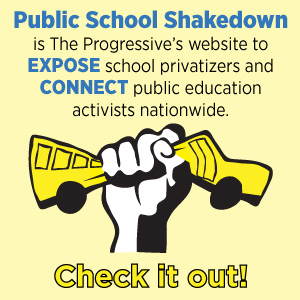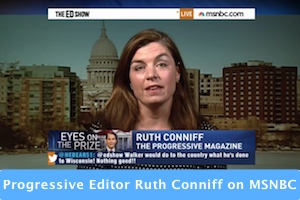We need to improve the condition of workers this Thanksgiving weekend. Here's what you can do.

- Jenny Wittner
Photo by Diariocritico de Venezuela
We need to improve the condition of workers this Thanksgiving weekend.
Black Friday and Cyber Monday may mean great deals for shoppers but they can be a terrible deal for the millions of retail and warehouse workers who are forced to work long, unpredictable hours. Recently, many stores have even stayed open on Thanksgiving, preventing workers from spending the holiday with their families and friends.
But the worst part is that so many of these workers are used to all this. That’s because employers aren’t just giving workers unstable, unpredictable shifts during the hectic holiday season — they’re doing it all year round. According to a recent study by Retail Action Project, nearly 40 percent of retail workers are given irregular schedules that wreak havoc on their lives.
That hourly employee who just helped you find the perfect sweater for your grandmother might be scheduled for 10 hours one week and 30 the next. She might be scheduled for mornings one week and evenings the next, with no set pattern, and only two or three days’ advance notice. She might pay her babysitter and commute for an hour, only to be sent home without pay because business is slow.
I say “she” because women make up two-thirds of low-paid workers and shoulder the majority of caregiving responsibilities. This means they’re especially affected by unstable scheduling practices. And their children feel it, too. Research by the Economic Policy Institute shows that children’s language and problem-solving skills may suffer when their parents have unpredictable schedules.
Recently, a number of major retailers, including Gap and Urban Outfitters, have promised to end one of their most abusive scheduling practices: on-call scheduling. This is the practice of requiring employees to be available in case they’re needed for a shift without guaranteeing any actual work or pay.
Ending on-call scheduling is a good step forward but retailers need to do much more.
And they can. While companies claim that they need to rely on unstable scheduling practices to maximize their profits, there’s very little evidence that these practices save money. Instead, they lead to costly turnover rates and unhappy employees.
What’s more, successful businesses such as Costco and QuikTrip show it’s possible to turn a profit while giving workers stable, predictable schedules. With set opening and closing hours and fairly predictable needs for staff, retailers can do the decent thing and give their employees stable schedules that let them plan their lives.
You can do your part, too. When you hit the stores this holiday season, choose retailers with good scheduling practices. Make a difference for low-paid workers by heading to stores that have promised to stay closed on Thanksgiving, such as Patagonia, Costco and Half Price Books.
We need to help businesses understand that when they do right by their employees, they’re also helping our families, communities and economy.
Jenny Wittner is the associate director of Women Employed, a 42-year-old advocacy organization that mobilizes people and organizations to expand educational and employment opportunities for America’s working women. She can be reached at pmproj@progressive.org.
Section:
Topics:
- Labor
More
- Subscribe
- Featured Video
- Recent Stories
- Recent Comments
- Poetry


“Climate change isn’t an ‘issue’ to add to the list of things to worry about, next to healthcare and taxes,” Klein...

Real leaders need to lead a push back against the firestorm of fear about Muslims—not fan the flames.
By Wendell Berry
Manifesto: The Mad Farmer Liberation Front
Love the quick profit, the annual raise, vacation with pay. Want more of everything ready made. Be afraid to know your neighbors and to die. And you will have a window in your head. Not even your future will be a mystery any more. Your mind will be punched in a card and shut away in a little drawer. When they want you to buy something they will call you. When they want you to die for profit they will let you know. So, friends, every day do something that won’t compute. Love the Lord. Love the world. Work for nothing. Take all that you have and be poor. Love someone who does not deserve it. Denounce the government and embrace the flag. Hope to live in that free republic for which it stands. Give your approval to all you cannot understand. Praise ignorance, for what man has not encountered he has not destroyed. Ask the questions that have no answers. Invest in the millennium. Plant sequoias. Say that your main crop is the forest that you did not plant, that you will not live to harvest. Say that the leaves are harvested when they have rotted into the mold. Call that profit. Prophesy such returns. Put your faith in the two inches of humus that will build under the trees every thousand years. Listen to carrion—put your ear close, and hear the faint chattering of the songs that are to come. Expect the end of the world. Laugh. Laughter is immeasurable. Be joyful though you have considered all the facts. So long as women do not go cheap for power, please women more than men. Ask yourself: Will this satisfy a woman satisfied to bear a child? Will this disturb the sleep of a woman near to giving birth? Go with your love to the fields. Lie easy in the shade. Rest your head in her lap. Swear allegiance to what is nighest your thoughts. As soon as the generals and the politicos can predict the motions of your mind, lose it. Leave it as a sign to mark the false trail, the way you didn’t go. Be like the fox who makes more tracks than necessary, some in the wrong direction. Practice resurrection.
Wendell Berry is a poet, farmer, and environmentalist in Kentucky. This poem, first published in 1973, is reprinted by permission of the author and appears in his “New Collected Poems” (Counterpoint).









Add new comment